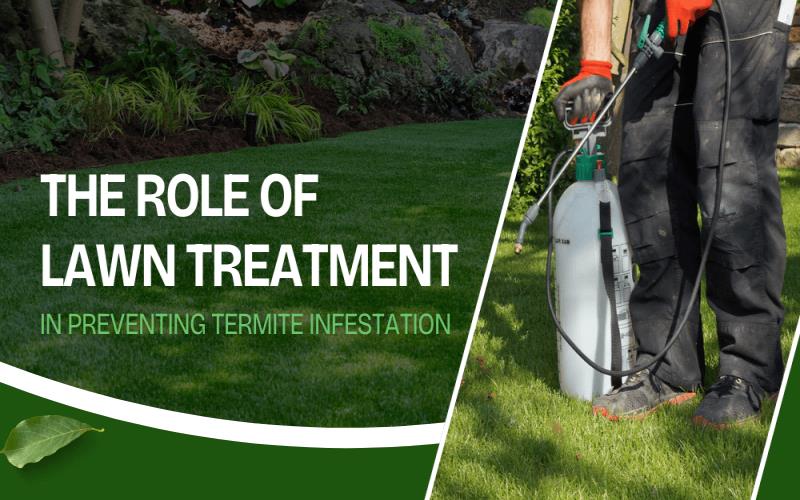Would your lawn care routine be the secret to a termite-free home? A well-maintained lawn does more than boost curb appeal—it helps create a barrier that deters termites from reaching your home’s foundation. Additionally, by focusing on innovative lawn treatment, you can reduce moisture, remove wood debris, and keep those destructive pests at bay. Discover how caring for your yard can protect your most significant investment.
Understanding How Lawns Attract Termites
A well-maintained lawn can enhance your home’s curb appeal, but it can also unintentionally attract termites if overlooked. Also, the excess moisture, organic debris, and structural proximity can create a pathway for termites to invade your home. To help you prevent these risks, consider the following factors that make lawns vulnerable to termite infestations:
-
Moisture accumulation:
-
-
- Overwatering or poor drainage leads to damp soil, creating the perfect environment for termites.
- Standing water near the home’s foundation can accelerate the problem, making the structure vulnerable to infestation.
-
-
Organic material and mulch:
-
-
- Termites seek out mulch, wood debris, and decaying lawn vegetation.
- Using untreated wood mulch or piling too much mulch around the property increases the risk by providing termites with a steady food source.
-
-
Proximity to the home’s structure:
-
- Lawns often act as a bridge for termites to move from the soil to wooden structures.
- Pathways, such as untreated soil, garden beds, or lawn areas touching the foundation, can give termites access to your home.
Targeted lawn treatment prevents termites from entering and protects your home from costly damage.
Essential Lawn Treatment Practices to Deter Termites
Furthermore, proper lawn treatment significantly deters termites and protects your home from costly infestations. Consistent care and strategic measures can disrupt the conditions termites rely on for survival. The following practices are essential for termite prevention:
-
Regular lawn maintenance:
-
-
- Trim the grass regularly and clear wood debris, leaf litter, and fallen branches to eliminate potential termite hiding spots.
- Removing clutter helps reduce shaded, moist areas where termites thrive.
-
-
Proper mulching techniques:
-
- To minimize the risk of infestation, use termite-resistant mulch, such as rubber or stone.
- To prevent direct termite access, avoid over-mulching and keep mulch at least 12 inches away from the home’s foundation.
-
Drainage and soil treatment
- Ensure your lawn has adequate drainage to prevent waterlogging and excess moisture.
- Aerate the soil and apply pest-resistant treatments to create a less favorable environment for termites.
Hence, implementing lawn treatment practices helps maintain a healthier yard and reduces the risk of termite invasions.
Integrated Pest Management (IPM) for Comprehensive Termite Prevention
Integrated Pest Management (IPM) offers a comprehensive approach to termite prevention by combining chemical, biological, and physical strategies with lawn treatment efforts. This holistic approach also ensures your lawn remains a strong defense against termites. The following methods enhance termite prevention:
-
Chemical soil treatments
-
-
- Apply termiticides in high-risk areas like garden beds near the home’s foundation.
- Use pre-construction soil treatments for long-term termite protection.
-
-
Biological controls:
-
-
- Introduce natural predators like nematodes to reduce termites.
- Add eco-friendly methods to lawn care for a balanced, pest-resistant yard.
-
-
Barrier creation:
-
- Install mesh or gravel barriers to block termite access.
- Seal cracks in outdoor structures, garden borders, and decks to prevent termite entry.
Long-Term Benefits of Professional Lawn Treatments
Professional lawn treatment services offer long-term benefits beyond a lush landscape—strengthening your home’s defense against termites. The following advantages highlight why investing in expert care is essential:
-
Expert diagnosis and targeted solutions:
-
-
- Professionals can identify termite-prone areas in your lawn with precision.
- To ensure effective results, they develop tailored treatment plans based on factors such as soil composition, climate, and pest activity.
-
-
Suitable prevention:
-
-
- Routine lawn care paired with periodic professional inspections helps prevent termite colonies from establishing.
- Consistent maintenance saves money by reducing the chances of termite damage and costly repairs.
-
-
Protecting property value:
-
- A well-maintained, termite-resistant lawn boosts curb appeal and protects the home’s structural integrity.
- It also builds buyer confidence, making your property more attractive to future homeowners.
Thus, combining professional lawn treatment with regular care keeps your yard healthy and safeguards your home from termite threats for peace of mind.
Protect Your Home from the Ground Up
Regular lawn treatment is key in keeping termites at bay by addressing the conditions that attract them. Therefore, consistently trimming grass, improving drainage, and using termite-resistant mulch strengthen your home’s first line of defense. Moreover, combining proactive lawn care with professional services ensures a comprehensive strategy that tackles termite risks before they escalate into costly repairs. For expert advice and customized solutions, consider scheduling a lawn treatment in Arkansas to safeguard your home and preserve its value.



